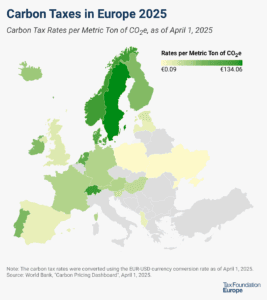
Impact of Italian Elections on National Tax Policy and EU Fiscal Policy
4 min readBy:Italy’s legislative elections on 25 September resulted in the country’s first right-wing government since 2011. Giorgia Meloni, leader of the Brothers of Italy, will likely become Prime Minister and govern in a coalition with the League (led by Matteo Salvini) and Forza Italia (led by Silvio Berlusconi).
On national tax policy, the coalition has been vague. This could be because the coalition partners have different economic programs and priorities. But once negotiations take place and the government is in office, a clearer program is likely to emerge.
One concrete proposal that Meloni campaigned on is to reduce the taxA tax is a mandatory payment or charge collected by local, state, and national governments from individuals or businesses to cover the costs of general government services, goods, and activities. rate on annual incomes of up to €100,000 ($99,750.00) for the self-employed to 15 percent. The same rate would extend to all taxpayers for income increases compared to the previous three years. By 2027, the party plans to simplify the income tax system from four rates to a single rate.
In the short term, Meloni believes she can fund the measure by cutting almost €9 billion earmarked in 2023 for a “citizens’ wage” poverty relief scheme and revenue from the government settling outstanding tax evasion disputes. These cuts are intended to prevent the government from adding to the country’s debt which is currently around 150 percent of GDP.
However, Meloni has also promised to soften the impact of energy price spikes, increase minimum pensions, and block a rise in the retirement age. It is unclear where the funding would come from for these spending priorities without adding to the debt.
At the EU level, Meloni has recently taken a softer tone towards Brussels than earlier this year when she delivered a speech saying, “no to the bureaucrats of Brussels!”
There have not been threats to pull Italy out of the euro or completely disregard EU law. She even stated that Italy would follow EU budget rules, although those rules are not currently being enforced until 2024.
However, she has said that the EU should revise the EU budget rules to give more leniency for investment and to leave expenditure on the energy crisis out of the calculations. Meloni also stated her intent to alter the country’s COVID-19 recovery plan negotiated with Brussels last year. If the EU refuses this request, Italy’s €19 billion December payment could be delayed.
Furthermore, Meloni has made statements in the past that would align her with Poland and Hungary on the role of the EU and national sovereignty. It is yet to be seen if this rhetorical alignment translates into policy alignment on issues that require unanimity.
It is more likely, however, that a Meloni-led government would veto a vote to increase own resources for the EU budget. Giving more power and financial prowess to the EU would be a contradiction to her belief that the EU should be a group of nations rather than a federal state.
As Meloni, Salvini, and Berlusconi negotiate a coalition policy agenda, it is important to keep the stakes in mind. According to the Tax Foundation’s 2021 International Tax Competitiveness Index, Italy’s tax system is the least competitive of the OECD countries (ranking 37th out of 37). To improve the Italian ranking and stimulate economic growth, leaders from all parties should encourage principled, pro-growth tax reforms.
Furthermore, with a debt-to-GDP ratio near 150 percent, additional destabilization to government revenue streams through unprincipled tax cuts (rather than wholesale reforms) could cause significant problems for budget sustainability over the medium term.
For context, Italy raises nearly 27 percent of revenue from individual taxes, and a PwC study found it takes 169 hours on average to comply with the labor taxes. This is by far the highest average in the OECD (where the average is 66 hours).
While gradually reducing the amount of income tax rates from four to one would dramatically simplify the tax system, policymakers should also think about how to adjust the overall tax mix to rely more on stable forms of revenue such as consumption taxes.
Currently, Italy raises about 27 percent of revenue from consumption taxes. The recent spike in energy prices and general inflation have kept government revenues stable and should serve as an example for future pro-growth reforms.
However, to improve the tax code’s competitiveness further, the government should expand the consumption base. Currently, the VAT rate of 22 percent applies to the fourth narrowest consumption base in the OECD.
In the EU, Italy plays an important role in economic policy. If the EU wants to further develop own resources, it will need the backing of the Italian government—which seems unlikely at the moment.
Over the coming months, EU leaders will see how Meloni navigates a coalition government. Only time will tell if principled pro-growth tax reform, new EU own resources, or general economic certainty will return to the Italian mainstream.
Share this article




